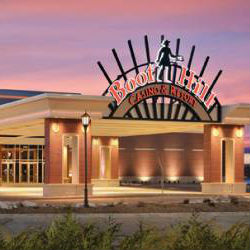Kansas lawmakers have been busy with legislation in April 2014. Both houses of the state government voted on a separate bills, one involving a Wichita racecourse and another a southeast Kansas casino.
Kansas House of Representatives Upholds Legal Slot Machine Law
The Kansas House of Representatives rejected a proposla to ban slot machines at the Wichita Greyhound Park found outside Wichita. Back in 2007, residents of Wichita voted against having gaming machines in the south-central Wichita facility.
The vote in the House ended 55-67 against the proposed bill. The Kansas Senate approved the bill in March 2014. The measure might be negotiated by the two Kansas chambers, as the issue is deadlocked at the moment.
Phil Ruffin, owner of the race track, wants to push for a new vote. His opponents want to postpone a second vote until 2032. These people say the slot machines violate a state contract with the owners of the Kansas Star Casino in Mulvane. Ruffin’s supporters say opponents of the bill are using the measure as retribution against Phil Ruffin, who supported moderate Republicans against Tea Party candidates in the 2012 elections.
Southeast Kansas Casino Approved
Meanwhile, both houses have now approved a bill which would bring a state-owned casino to southeast Kansas. The bill significantly lowered the investment requirement, down from $225 million to $50. An additional fee that would be charged to the developer was lowered from $25 million down to $5.5 million.
The House voted 84-36 to approve the bill on April 2. The previous week, the Senate approved the same bill. Governor Brownback has not said whether he’ll sign the bill, but it is expected he will sign the legislation. The bills were passed after 5 years of work lobbying politicians in the state.
New Casino Should Be a Job Maker
State Representative Michael Houser, “This will be a job-maker and bring more businesses in.” Michael Houser is Republican from Columbus. His district is the one the most likely to receive the planned new casino. The only certainty is the casino will be located in the southeast corner of Kansas.
The previous three state-owned casinos, in the areas around Wichita, Kansas City, and Dodge City, have been successes. All four casinos were approved in a 2007 vote, but the one allotted for the southeast never came to fruition, due to the 2008-2009 recession.
The state maintains the gaming rights in these casinos, but hires private interests to develop and operate the casinos. The state claims a significant share of the revenues.
Lawrence Man Filed Gambling-Related False Tax Form
Not all the gambling news out of Kansas recently has been legislative. From the legal file, a Lawrence, Kansas man is alleged to have filed a false tax return which leaves him facing a maximum 3 year prison term and a possible $250,000 fine. Bradley Stoneking, a 30 year old gambler from Lawrence, is charged with filing a tax return which claims false tax withholdings.
Mr. Stoneking filed a return in 2010 which claims federal tax withholdings of $330,000. The tax withholdings on his winnings instead were $300. Someone can claim a mistake in such cases, but a discrepancy of nearly $330 thousand makes the IRS auditors incredulous.
The Internal Revenue Service investigated the claim, after they found the large tax withholdings, but had no record of collecting that money. With April 15 just around the corner, this should be a reminder to everyone to double-check their numbers before putting their return in the mail. Assistant U.S. Attorney is prosecuting the case.
Kansas Gaming Laws
The two pieces of legislation recently considered by Kansas politicians show the lumbering nature of gambling legislation, when a state’s people are unsure what they want. In one case, a negotiation will have to take place, but it is possible a wait of another 18 years will be the decision. In another case, casino construction appears ready a full 7 years after a development was approved.
Kansas gambling laws continue to evolve in a state which tends to vote for conservative candidates. But even majority parties sometimes have fractures, which is why the legislature has not come to a full decision on the greyhound racing track.

